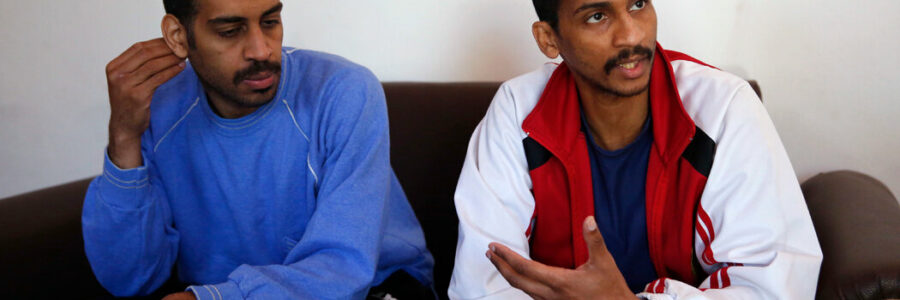
British Give U.S. Evidence Against ISIS ‘Beatles,’ Clearing Way for Trial
WASHINGTON — The British government has transferred evidence to the United States against two notorious Islamic State detainees from Britain accused of playing a role in the torture and beheadings of Western hostages, apparently clearing the way for putting them on trial.
The transfer followed a ruling by the United Kingdom High Court on Tuesday rejecting a new legal challenge to the British government cooperating with the United States, which one detainee’s mother had filed.
“We are pleased with the U.K. High Court’s decision and we are grateful that the British government has passed its evidence to us and confirmed its commitment to cooperate with our efforts to investigate and prosecute the two ISIS terrorists currently being held in U.S. military custody,” said Marc Raimondi, a Justice Department spokesman.
He added, “We remain committed to holding these defendants accountable and obtaining justice for the victims of their terrorist activity.”
The two men, El Shafee Elsheikh and Alexanda Kotey, were captured by a Kurdish-led militia in early 2018. Last October, amid swelling chaos in northern Syria after President Trump’s endorsement of a Turkish operation to attack the militia, the Syrian Democratic Forces, American troops took custody of the men and brought them to a military base in Iraq.
They were half of an Islamic State cell of four Britons who handled hostages — some of whom were eventually beheaded on propaganda videos — and whose victims nicknamed them the “Beatles” because of their accents.
The cell is believed to have played a role in the killings of 27 people, including James Foley, an American journalist who was an early beheading victim in 2014, and two other Americans, Steven Sotloff and Peter Kassig.
A third member of the cell, Mohammed Emwazi, was killed in an airstrike in 2015 in Syria. Known as Jihadi John, he is believed to have personally beheaded American and British hostages. A fourth, Aine Davis, is imprisoned in Turkey on terrorism charges.
The Justice Department has long planned to prosecute Mr. Elsheikh and Mr. Kotey in Northern Virginia. But the proceedings have been delayed because the British evidence has been seen as essential to a trial, and litigation in Britain had kept it tied up.
While the British government showed the evidence it had to American officials, it was unable to transfer it because Mr. Elsheikh’s mother filed a lawsuit challenging the legality of further cooperation. The primary issue was that the attorney general at the time, Jeff Sessions, opted not to make assurances that the United States would forgo the death penalty — over the objections of four American families whose children were killed by the Islamic State.
Because Britain has abolished the death penalty, such assurances are usually routine when the United States is working with the British criminal justice system. In March, the British Supreme Court preliminarily sided with Mr. Elsheikh’s mother and blocked the government from sharing the evidence and providing assistance in the case.
But last month, after a push by the Pentagon to find a disposition option for the detainees, Attorney General William P. Barr reversed Mr. Sessions’s stance and provided assurances to Britain that American prosecutors would not seek the death penalty against the two potential defendants after all.
At the same time, however, Mr. Barr imposed a deadline of Oct. 15 for the British government to resolve litigation that has tied up its ability to transfer the evidence. If it failed to do so by then, he threatened, the United States would instead transfer the two men to the custody of the Iraqi government.
The concession, coupled with that threatened deadline, appears to have cleared the logjam in Britain. While Mr. Elsheikh’s mother then filed a new case before the High Court saying it would be illegal to transfer the evidence because her son should be tried in Britain, a lower body in the British judicial system quickly disposed of the case in its ruling on Tuesday.
When the British government had previously proposed to share evidence “without a death penalty assurance, this was an unusual case,” wrote one of the judges, Dame Victoria Sharp. “Notwithstanding the barbaric nature of the offenses alleged, now that the death penalty assurance has been given it has become” routine and the government can proceed.
Senator Jeanne Shaheen, Democrat of New Hampshire, who has worked closely with the Foley family and the Justice Department on trying to get a civilian trial for the two men, praised the development in a statement as a “breakthrough.”
“This is very welcome news and a critical step to ending the legal limbo that has stalled justice” for the victims and their families, she said, adding, “Today, we are several steps closer to bringing these terrorists to justice in the United States.”
Source: Read Full Article